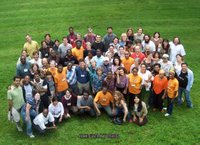We do not know when Bakhalil was born and nobody really knows even himself. He says he is over 75 and that's it.
a living encyclopedia of the southern deserts of morocco. He knows every inch and every person. He is the oldest son of Khatra, a poet and crafts man. A sahrawi from Tajakant tribe. Bakhlil inherited his father's job(s)." If you master the crafts of your fathers, you will never be defeated by others"(Sahrawi Proverb). As he grew up, he becomes the speaking conscience of his area: Smart, sharp and skillful in carving wood, silver and jewelry, and words.
He lived everywhere. The Hamada of Gir, Zegdu, Lemaider, Tafilalet, Oued Draa; areas that some call "sites" and others call them military "zones".
When Life called for settlement, Bakhalil took his family to M'Hamid Lghouzlan and built a house for them. In the main courtyard, he had a huge tent where everyone sits for Atay (tea)ceremonies. He would be doing his work while someone else is preparing the tea. A daughter, his wife or anyone from the neighboring area. Tea is the only thing people do without thinking of how long it takes nor do they even worry about the details for the acomplishment it's details. As spontaneous as they are, saharawis have acquired the skills of a simple life. A ritual simlicity.
Settlement was a hard shift for most sahrawis nomads even for Bakhalil himself .It was a slide down and a degradation as he still thinks there is nobetter life than the desert and the peace a tent can provide when standing in the Hamada or close to the sand dunes. Nothing can grant peace more than a walk in the afternoon along sand dunes and see the horizon in it's right place at night when the stars cover up the universe and get closer the more you look at them.
in 1979, the psodo-peace of Mhamid, at least the culturally enforced side of it, was disturbed by the invasion of the Polisario army asthey raided over the area and shooting started...
Everybody had to seek refuge in the palm tree forests. People fled to the neighboring villages and had to stay there for days . Bakhalil stayed at home and the next week ,he had his family moved to Zagora, a bigger town 90 miles away. The house like all other houses was deserted. Very few people went back to their homes after the battles finished but Bakhalil didn't.
For the kids to go to school, Bakhalil had to think about another start again." We always start" he say.
He preferred to stay a crafts man. He opens a small workshop in Hassi Barka, not far from Zagora down town. He kept the skill of his fathers alive and kept the poetry and the desert wisdoms he learned as a divine tortch of hope and love forlife.His smile bigger than the univers. He made wooden camels, bracelets, knives, and all kinds of small tools for house holds and for other nomads who still live in the desert.
Bakhalil's house has always been open to everyone. He never had to lock it. And it all looked like he never wanted any locks; although, his wife ,Khalti, always demanded locks for security measures."may be it is the fashion". She knows this is a big town and you do not just keep your house open in a big town.
People do not need to be invited. They just come and this is the thing that gives Bakhalil and other saharawi people a sense of who they are and keeps them informed about things happening anywhere. When they meet, they learn and they teach.
"weld men nta?" (son of whom are you?) is the only key question when you go anywhere. Bakhalil would know who you are sometimes by looking at you. "you have the blood of.. and you must be the son of Mr.X".
Bakhalil embodies all the power of an oral culture that has survived for many centuries needing no graphic representation.





